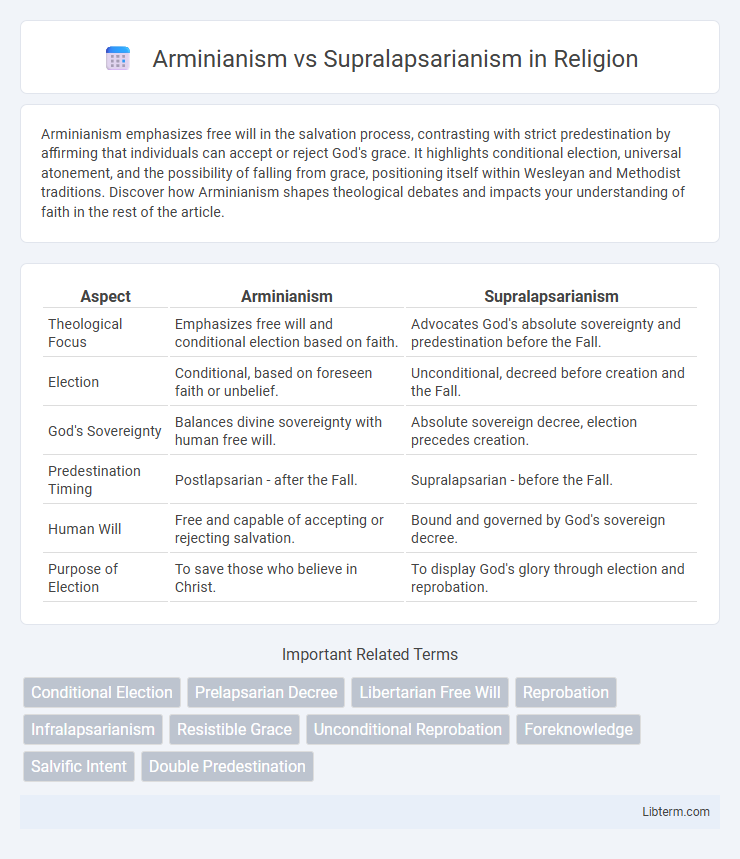Arminianism emphasizes free will in the salvation process, contrasting with strict predestination by affirming that individuals can accept or reject God's grace. It highlights conditional election, universal atonement, and the possibility of falling from grace, positioning itself within Wesleyan and Methodist traditions. Discover how Arminianism shapes theological debates and impacts your understanding of faith in the rest of the article.
Table of Comparison
| Aspect | Arminianism | Supralapsarianism |
|---|---|---|
| Theological Focus | Emphasizes free will and conditional election based on faith. | Advocates God's absolute sovereignty and predestination before the Fall. |
| Election | Conditional, based on foreseen faith or unbelief. | Unconditional, decreed before creation and the Fall. |
| God's Sovereignty | Balances divine sovereignty with human free will. | Absolute sovereign decree, election precedes creation. |
| Predestination Timing | Postlapsarian - after the Fall. | Supralapsarian - before the Fall. |
| Human Will | Free and capable of accepting or rejecting salvation. | Bound and governed by God's sovereign decree. |
| Purpose of Election | To save those who believe in Christ. | To display God's glory through election and reprobation. |
Introduction to Arminianism and Supralapsarianism
Arminianism emphasizes free will and conditional election based on God's foreknowledge, contrasting with Supralapsarianism, which posits God's decree of election and reprobation prior to the fall of humanity. Arminian theology stresses human responsibility and prevenient grace as essential for salvation, while Supralapsarianism asserts God's sovereign choice as determining salvation independently of human response. This fundamental difference shapes debates on divine sovereignty, predestination, and human agency within Christian doctrinal frameworks.
Historical Background of Both Doctrines
Arminianism originated in the early 17th century with Jacobus Arminius, who challenged the strict predestinarian views of Calvinism by emphasizing free will and conditional election, shaping its theological foundation during the Dutch Reformed tradition controversies. Supralapsarianism, a subset of Reformed theology, emerged in the 16th and 17th centuries as a way to explain God's decree of election and reprobation, asserting that God's decision to save or condemn individuals was made logically prior to the Fall of humanity. Both doctrines reflect critical responses to issues of divine sovereignty and human responsibility within Protestant theological debates during the Reformation and post-Reformation eras.
Core Beliefs of Arminianism
Arminianism centers on the belief in free will, asserting that God's election is conditional based on foreseen faith, contrasting with supralapsarianism's view of predestination before the Fall. It emphasizes prevenient grace enabling humans to respond to God's offer of salvation, rejecting the doctrine of irresistible grace upheld by supralapsarians. Key doctrines include conditional election, universal atonement, resistible grace, and the possibility of falling from grace, highlighting human responsibility in salvation.
Core Beliefs of Supralapsarianism
Supralapsarianism asserts that God's decree of election and reprobation logically precedes the decree to permit the fall of humanity, emphasizing divine sovereignty in predestination. It maintains that God's primary purpose is the manifestation of His glory through the salvation of the elect and the condemnation of the reprobate, independent of human free will. This view contrasts with Arminianism by denying conditional election and affirming an unchangeable divine plan established before creation.
Key Theological Differences
Arminianism emphasizes conditional election based on God's foreknowledge of human free will, while Supralapsarianism asserts God's decree of election and reprobation logically precedes the Fall. Arminians advocate prevenient grace that enables human response, contrasting with Supralapsarian determinism where God's sovereign will is the primary cause of salvation and damnation. The theological debate centers on the order of God's decrees, human free will, and the nature of divine sovereignty in salvation history.
Views on Predestination and Free Will
Arminianism teaches conditional predestination based on God's foreknowledge of human free will choices, emphasizing prevenient grace that enables individuals to accept or reject salvation. Supralapsarianism asserts God's predestination logically precedes the Fall, with the divine decree ordering election and reprobation before creation, highlighting God's absolute sovereignty. The core contrast lies in Arminianism affirming libertarian free will and resistible grace, opposed to Supralapsarianism's view of monergistic election and a deterministic divine plan.
Biblical Passages Used in Each System
Arminianism commonly cites passages like John 3:16, emphasizing God's universal love and conditional election based on foreseen faith, while Romans 8:29-30 underlines predestination linked to human response. Supralapsarianism draws heavily on Romans 9 and Ephesians 1, highlighting God's sovereign decree to elect some for salvation and others for reprobation before the Fall. Both systems engage with Genesis 3 for the doctrine of sin but diverge sharply on the logical order and intent of God's decrees regarding election and human free will.
Influence on Christian Denominations
Arminianism significantly shapes Methodist, Wesleyan, and Pentecostal traditions by emphasizing free will and conditional election, promoting a theology of grace and human responsibility. Supralapsarianism is primarily associated with Reformed and Calvinist denominations, advocating the doctrine of predestination and God's sovereignty in election before the fall. These theological distinctions influence doctrinal teachings, worship practices, and views on salvation across diverse Christian communities.
Modern Perspectives and Debates
Modern perspectives on Arminianism emphasize human free will and conditional election, contrasting sharply with the Supralapsarian view that God's decrees, including election and reprobation, are logically prior to the Fall. Contemporary theologians debate Supralapsarianism's implications for divine justice and sovereignty, often questioning its coherence with God's loving nature. The ongoing discourse highlights tensions between God's foreknowledge, human responsibility, and the order of divine decrees within Reformed theology.
Conclusion: Implications for Faith and Practice
Arminianism emphasizes free will and conditional election, which encourages believers to actively participate in their faith through repentance and perseverance, fostering a dynamic relationship with God. Supralapsarianism asserts God's sovereign predestination, highlighting divine sovereignty and divine justice as foundational, which leads adherents to a trust in God's ultimate plan despite human limitations. The theological implications shape doctrines of grace, assurance, and evangelism, directly influencing personal devotion and communal worship practices.
Arminianism Infographic

 libterm.com
libterm.com